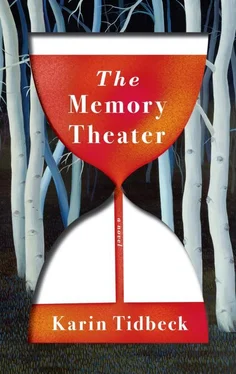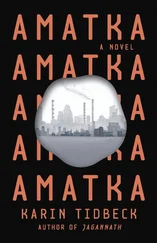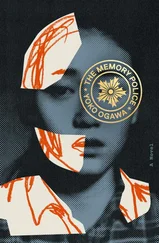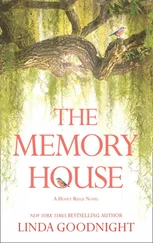A little track led into the depths of the forest. This was not so different from the forest that surrounded the Gardens. Perhaps she was close after all.
She lost the trail almost immediately, stumbling over rocks and tree roots. The smell of the night forest filled her nose: pine needles, decomposing leaves, damp earth. Somewhere, an animal let out a barking noise. Nearby, something else hooted.
“Euterpe!” she called. “Mnemosyne! Walpurgis!”
—
At first it seemed that the light was just right, a familiar blue that erased all shadows, soft on the eye. Augusta thought that she could see the conservatory’s great dome just beyond the trees, and her heart lifted.
“Euterpe!” she shouted. “I’m here!”
She ran through the forest, her chest burning with every breath. Twigs whipped at her sides, and once she stumbled and scraped her knee. She got back up and forced herself to run faster, away from the world, toward safety.
But then birds began to sing, and as the light grew, the tree trunks all around took on a hard silhouette. Then the trees abruptly ended. Before her, a great plain spread out, rolling fields that smelled of manure and dewy growth. Ahead, what she thought had been the conservatory’s dome. It was the top of a tower. On a hill in the middle of the plain sat a great castle, peachy pink in the morning light. Beyond the castle, the two tall spires of a cathedral soared into the sky. A city sprawled beneath them. It all tugged at something in Augusta’s mind. She had seen a city like this before, and she had loathed it.
Augusta looked over her shoulder at the forest, backlit now by the rising sun. Mnemosyne had truly cast her out. How dare she?
There must be a way back into the Gardens. Perhaps this place would have some answers. At least there would be food and drink. Augusta would return to the Gardens, and return in triumph. Nil desperandum. She began to walk.
Augusta walked past fields and farms along a gravel road that eventually became a cobbled street. She continued in among one- and two-story stone houses that were occasionally interrupted by wooden cottages. Save for an odd roar in the distance, the street was quiet. A woman emerged from one of the houses and crossed the road in front of Augusta; she was wearing a knee-length coat of an odd, formless cut and a drab little hat. Her calves were scandalously bare. Even so, her posture and colors made Augusta think of wood lice. The woman glanced over her shoulder at Augusta and stumbled over her own feet. Augusta chuckled but was interrupted when she saw a man rolling down the street astride a wheeled contraption. A woman followed him on another thing just like it. Augusta stared at them in fascination. Then the aroma of baking bread hit her like a wave.
The shop sat on a corner. On the other side of the window, a man kneaded an enormous lump of dough while a girl took out tray after tray of cakes from a large oven. Augusta tried the door. It was locked. She banged on the glass pane. The girl took off her oven mittens and came to open it. She looked up at Augusta with large, mottled eyes in a slim face.
“We’re closed,” she said.
“You will open for me,” Augusta told her in her lady voice, as when addressing a servant, and watched with satisfaction as the girl’s mouth slackened and her eyes became glassy.
“Of course,” the girl said after a moment. “Come inside.”
In the little space, there was a counter and a glass cabinet filled to the brim with cakes. The smells in here made Augusta’s mouth water: bread, baking fruits, spices.
“I want one of everything, and water,” she told the girl.
The girl obediently took out a small box and filled it, then filled a glass bottle with water and set them both on the counter.
“Good girl,” Augusta said.
—
Augusta left with the box and the bottle in her arms. The houses rose higher, stately with elaborate facades. Twice, foul-smelling carriages roared past her, seemingly without anything to pull them. More and more people emerged into the street. They were doughy and mundane little things, most of them with skin like sand, fair or auburn hair sticking out from under the brim of lumpy hats or headscarves. The women walked around in more of those scandalously short dresses that displayed their legs, which would have been interesting if said dresses were not in such excruciatingly dull shades; the men wore ill-fitting short jackets and long trousers. They stared at Augusta. Augusta stared back. She sat down on a bench under a tree to drink the water and eat the pastries. They were delicate and crumbly, some of them filled with berries, others twisted into elaborate shapes. The sun blazed overhead, but Augusta was slowly getting used to it. She let it warm her shoulders as she watched the people passing by. When she was finished, she left the bottle and box on the bench.
This place was familiar, and yet not. She had hated a place like this and could not say exactly why, but she had her suspicions. It was noisy and smelly and crowded. There were parks, but the trees were stunted and manicured. The paved streets were disturbed by horses and carts, rattling vehicles, and above all, people. The river that flowed through the city looked muddy and cold. And yet, Augusta found herself intrigued. All around her, people scurried like mice, like insects, giving her a wide berth. She wandered the streets until the light softened and her feet hurt.
There was a side street of rose-trellised wooden houses, away from the hustle and bustle. One of the houses had a door embossed with flowers, and two little porcelain dogs sat in the window. Augusta climbed the steps to the door and pushed down the handle. It was unlocked.
—
She stepped into a room. An old woman in a dress and an apron was stirring a pot on a stove. A younger woman sat at a table by the window, darning socks. They both looked up as Augusta entered.
“Who are you?” said the older woman. “What are you doing here?”
“I’m going to live here now,” Augusta said. “What are your names?”
The younger woman was meek. “My name is Elsa,” she said.
The crone frowned and walked over to where Augusta was standing.
“You won’t have my name,” she said. “Get out. You’re not welcome here.”
Augusta drew herself up and stared at the woman. “Do as I say.”
“I…” the crone said, and faltered.
“You’re going to be trouble,” Augusta said.
She put her hands around the old woman’s throat and squeezed. When her victim had stopped struggling, she turned to the girl.
“Elsa. You are my maid now.”
Elsa dragged her mother’s corpse into a chamber next to the kitchen. She sobbed all the while, but she did not resist Augusta. She showed Augusta to a small room with a bathtub, which she filled with warm water that miraculously came out of the wall.
“How marvelous,” Augusta said. “How does that work?”
“It’s just water,” Elsa mumbled. “I don’t know.”
While Augusta washed herself, she made Elsa answer questions. The city was called Uppsala, and someone named Gustaf the Fifth was king. A country called Germany was making war, invading its neighbors. The Germans might come here or they might not. Times were hard.
When Augusta had dried off, Elsa showed her into a larger bedchamber and opened an armoire. Augusta waved away the flimsy dresses Elsa presented her with. Finally, Elsa opened another door and took out a black suit of the same strange cut Augusta had seen the men wear in the street.
“This was Father’s Sunday best,” Elsa said, and her eyes watered a little.
“It will do,” Augusta said, and put it on.
She looked at herself in the mirror on the armoire’s door. It showed a woman completely devoid of interesting details and scents. Her hair was still wet and hung almost straight down. And her face, her face. Pages had always adorned it with artful designs, to suit a noble of good taste. Without them, her face seemed empty: the round eyes had no edges, the broad cheekbones that invited swirls lay bare; her mouth was like a half-healed wound. No lord or lady even in their most extravagant stupors had ever gone with a naked face.
Читать дальше










![Карин Тидбек - Аматка [ЛП]](/books/438406/karin-tidbek-amatka-lp-thumb.webp)

